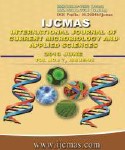


 National Academy of Agricultural Sciences (NAAS)
National Academy of Agricultural Sciences (NAAS)

|
PRINT ISSN : 2319-7692
Online ISSN : 2319-7706 Issues : 12 per year Publisher : Excellent Publishers Email : editorijcmas@gmail.com / submit@ijcmas.com Editor-in-chief: Dr.M.Prakash Index Copernicus ICV 2018: 95.39 NAAS RATING 2020: 5.38 |
A field experiment was conducted at JNKVV, Jabalpur during kharif 2015, to evaluate the effect of Rhizobium cultures with supplementation of inorganic phosphorus (Pi) onthe performance of soybean and physico-chemical properties of soil in a Vertisol soil. The experiment was laid out in Randomized Block Design with three replications comprised of 12 treatments including two type soybean rhizobial cultures (liquid formulation and carrier based) in combination with three levels of Pi (@ 40, 80 and 120 kg P2O5 ha-1) and one control (unfertilized + uninoculated). The result reveled that the nodulation higher at 45 days after sowing (DAS) and followed by a reduction at maturity. Treatment P80+LRh (80 kg P2O5 + liquid inoculum of Rhizobium) for enhanced the nodulation attributes, over the control at 45 DAS. The treatment P80+LRh gave maximum nodules number (81.1%), weight (89.1% fresh and 78.5% dry) and N content (64.4%) over control (6.9 number/plant, 103 mg/plant, 65 mg/plant and 2.03%), respectively. Similar treatment increased available N andPin soil at harvest by 42.8 and 92.8%, respectively over control (189 and 14 kg/ha, respectively) and statistically no difference was notice in case of K and it was maximum by P80+LRh (295 kg/ha). The treatment P80+LRh also increased seed and stover yields of soybeanby 75.4 and 88.8% over the control (1025 and 2206 kg/ha), respectively. While the treatment P120+LRh exhibited numerically higher values of P80+LRh but statistically at par to P80+LRh.
 |
 |
 |
 |
 |